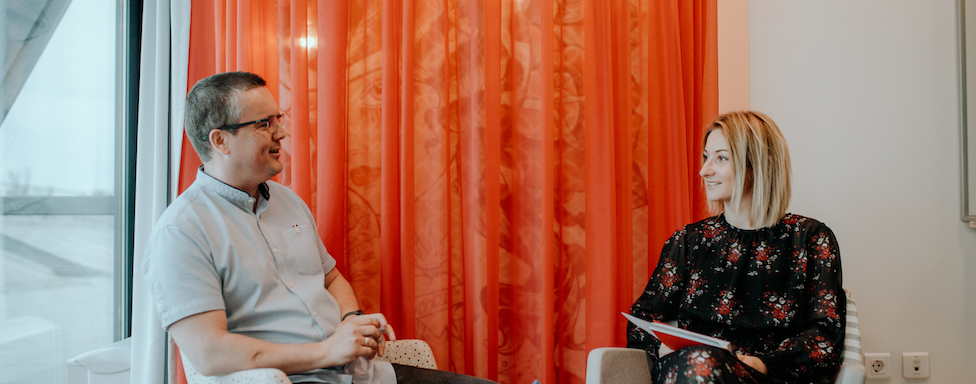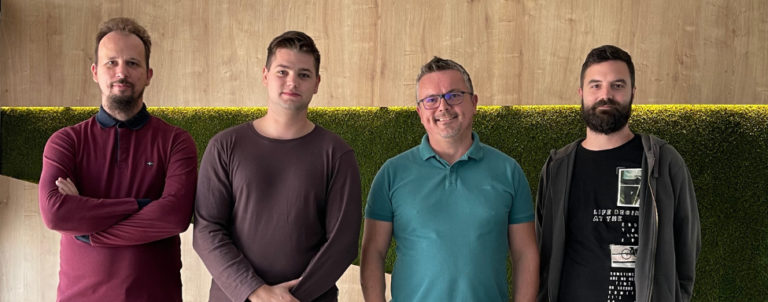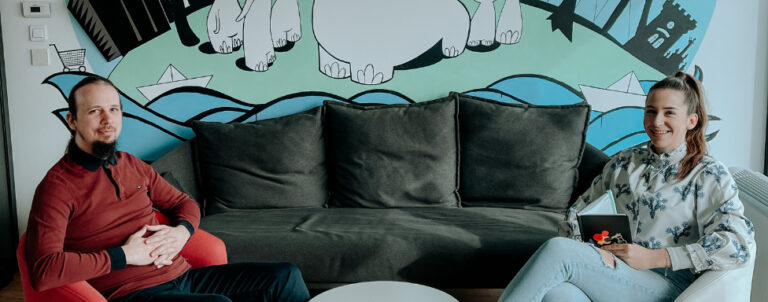Today we are celebrating our 12th birthday! Wow, so many years in which we had a lot of beautiful moments are already behind us!
Tomislav Bilić, founder and CEO of the company, on this day back in 2008, registered the company at the Commercial Court in Osijek as a legal entity. I interviewed Tomislav, and he told us about his entrepreneurial experience, how the eCommerce ecosystem looked like 12 years ago compared to today, and what are his plans for the future.
Hello Tomislav! First of all, I would like to congratulate you on 12 successful years! Please tell us how did Inchoo’s story start and how popular was eCommerce back then?
Hello Zrinka, thank you! ?
Twelve years ago, Inchoo started as a freelance business. Even though when I was the only employee, I had a vision that the story of Inchoo could expand faster. Since I worked on different platforms such as osCommerce, Zen Cart and CRE Loaded, I was in eCommerce business years before Inchoo.
When Magento launched its first version in 2008, I predicted huge changes in this niche, and I wanted for Inchoo to be a part of the upcoming changes. Even though this was just at the start of the recession, it was a good time to start an eCommerce company because a lot of firms wanted to optimize their operating expenses and they wanted to invest in online solutions so they could attract new customers and conquer new markets.
During that period, there was a significant increase in customers who were buying online. As the years went by, online shops became a lot more popular. Daily Deal shops (e.g., Kolektiva, KupiMe and later Crno Jaje) with their huge discounts, played a huge role in the popularization of online shops in the Middle East and the Balkans. In the last ten years, eCommerce is expanding at an unstoppable rate of 15-18% on a global scale.
Inchoo is not your first entrepreneurial experience, and you’ve been in entrepreneurship for 17 years. What kind of challenges did you face, and what’s it like to be an entrepreneur in Croatia?
Upon entering the entrepreneurial lifestyle, it was challenging for me that I never had a manager or a business owner to answer to, because I always carried out my own ideas. My honest advice to young people is to work a couple of years in a well-organized company so they could have a better understanding of how it’s like to be an employee when they start their own business.
What’s it like to be an entrepreneur in Croatia? I think that it is harder than in other European countries. Even the word “entrepreneur“ in our country often has a negative note because the word is associated with a lot of ugly post-war stories regarding entrepreneurship. Although sometimes I have a feeling that I’m like Don Quijote, who is fighting against the windmills, I believe that for me, entrepreneurship is my calling. It allows me to change myself, to influence the development of my colleagues, and to impact the community.
I am proud to say that we have a superb team here in Inchoo! The employees have fantastic potential for further growth and development, and I’m glad that we are a good business example. It’s a pleasure to see how Inchoo, without false modesty, had an impact on the local community and played a huge role in shaping a new business identity for Osijek, which is well recognized in Croatia and abroad.
Out of these 12 years, which one would you highlight that had the biggest impact on how Inchoo looks like today?
Every year had some surprises, but I would like to mention 2011 and 2019. In 2011, we made a huge leap regarding the development of the company. That year we managed to make progress towards the acquisition of our targeted clients with whom we made big and exciting projects, far bigger than any we made until then. That year, our revenue growth was around 130%. Last year was extremely important for our development. In 2019, we made more organizational changes than ever, and we made solid foundations for taking the company to a whole new level.
In the last two years, you have visited less conferences, and you are less active in the local community. What were you working on?
The organizational structure of a company has to adapt to how the business is expanding. Our scenario was that we neglected our organizational adjustments, and because of that, we felt the consequences. Recently I dedicated my time to arrange the organization to have good fundamentals for future growth and development in the years to come. Because of that, I am less active in the local community, and I rarely go to conferences, which I hope will change in the future.
The first version of the Magento platform was published in 2008, and Inchoo was founded in the same year. Apart from Magento, Inchoo worked with some other platforms. What is the story behind that?
Around 15 years ago, the whole eCommerce ecosystem was pretty simple. There were a couple of eCommerce platforms whose functionality could have blended into the majority of online clients. They were simple and easy to master. I remember that it took me a month and a half from the process of learning to launching a project on osCommerce. Today the situation is different. On one hand, clients have different profiles and different needs, so there’s not a universal solution that can satisfy everyone. On the other hand, customers have more and more needs, and in the upcoming years, I expect that the whole eCommerce ecosystem will be even more colorful.
In the beginning, Magento was presented as a platform for clients regardless of size. Over time it became apparent that this goal was getting increasingly difficult to achieve. First, it started to move away from very small, home-owned businesses. After that, it started to move away from small and medium-sized businesses. At Magento’s last conference, they announced that they have decided to focus on the Mid-Market. That means that the market has a huge need for finding a quality on-premise solution for SMBs.
The development of Inchoo was tied to the development of skills on the Magento platform. Throughout the years, we worked with bigger clients who had a wide range of needs. In the past, we had experience with Shopify, BigCommerce, and Sylius platforms, but they were not a great choice for us back then. Recently we’ve been observing Shopware, and even though we don’t have a project built on that platform yet, we noticed that this platform could be good for the clients that don’t prefer Magento.
Progressive Web Applications (PWA) created a huge interest, and Inchoo put a lot of effort into making a Magento PWA demo store. Is PWA the right choice for Magento clients?
Inchoo has a special love-hate relationship regarding that topic. When they first mentioned this concept, I thought it was interesting because of organizational and development goals. I wanted for the frontend team to develop their skills not only with Magento, so we could develop certain sectors in the company better.
The PWA concept today is pretty common on the web, and for some apps, it became a must-have, but it is challenging to implement it in a platform such as Magento. Magento PWA Studio is developing slower than expected, and as for other solutions, there isn’t a standardized, reliable one that we can count on. When making a PWA solution, it is not enough just to build it; you also need to connect it to the extensions, maintain and allow for it to be resistant for future Magento versions and upcoming changes. PWA brings high maintenance costs after the main build, and its financial weight is transferred onto the clients, which could lead to dissatisfaction, can compromise their business, and delay their further growth.
There was hype, and the clients thought those solutions were very attractive. There aren’t many articles about this topic, but a lot of clients started with implementing PWA, spent a lot of money, and later gave up on it. Of course, they came back to the standardized and safe way. We concluded that PWA solutions do not justify their high costs, and following a vision of Merchant’s Best Friend, we would like to suggest to the clients those solutions that we think are the best for them. Because of that, we do not promote PWA as the desired solution for Magento clients.
Magento has a large community around itself, and we always gladly remember the conferences we put together, such as Developers Paradise and Meet Magento Croatia. What was Inchoo’s role in building this community around Magento?
Since the beginning, Magento did a fantastic job regarding the founding of the community, which was full of innovators and enthusiasts that loved the new platform. The community, as well as the platform, developed over time. My favorite memories were the ones when the community was smaller because the whole story was much more personal, fewer people were involved, and you had a feeling that everyone knew each other. Still, it is great to see how many people are involved today. One thing I’m especially glad about is that I met a lot of new people and made a number of friends.
I am proud of Inchoo for having such a special role in the community. In the beginning, a lot of developers learned from our blog about Magento because we were writing about various tech topics, and back then, there was no official documentation available. Because of that, our blog was one of the few sources of information where one could learn something.
During the opening of the conference Meet Magento Croatia, Ben Marks said that he learned from our blog as well from Alan Storm’s blog when he was a developer. Because of that contribution to the community, a lot of guests from different countries visited our conferences, because they love Inchoo and the people.
Developers Paradise in 2016 was something else. The conference took place in Opatija, on the Croatian coast, and up to today, it remains one of the biggest conferences aimed only at Magento developers. The organizational team did a fantastic job, and people still talk about it on social media. It is not uncommon for the participants to gladly remember that fantastic event, parties, and conversations that happened four years ago. It is nice to see that what you are doing makes sense, and it is recognized in the community.
Work Hard. Party harder. #DevParadise #wearemagento pic.twitter.com/1JiT9f0HBl
— Interactiv4 (@interactiv4) April 26, 2016
The whole world felt the influence of the pandemic from the coronavirus, and a lot of companies suffered significant losses. How did this situation reflect on Inchoo?
It’s too soon to conclude how COVID-19 influenced business because the pandemic has both a short-term and a long-term effect. If we look at the short-term, Inchoo even got a somewhat of a positive nudge organizationally, because we were prepared for remote work, and we adapted much faster to some changes, which will surely leave a permanent positive effect for our future business.
Looking at the long-term, it is, without a doubt, a new economic crisis in the making. However, I believe that it won’t have a significant impact on our company because I expect that a lot of clients will start making larger investments in eCommerce in the years to come.
How do you see Inchoo’s development in the next five years?
In the next few years, Inchoo will develop through a couple of business stages. The first adjustment of the company will be more focused on remote work, and I expect that we’ll be much more open to employing people remotely. As for the second adjustment, we will increase investments in our own education process by starting an eCommerce academy, which we will initiate so we can improve the training process for our employees.
Lastly, we will continuously upgrade our skills in all fields that we’re working on – development, UX/UI, online marketing, project management, etc. All of these changes will lead to us building projects that will have a more profound effect on the eCommerce growth for our clients. When the company is ready for it, I believe that one part of the business will be dedicated to the development of our own products. I would like to reach a number of 100 employees, but that is not a priority in this story! ?
To sum up, after these 12 years, what would you say is the biggest value of Inchoo?
Once I was at a conference where Osvaldo Spadano from Akoova presented Inchoo by saying: Nobody cares for their clients as much as Inchoo does. I was really glad to hear those words.
That’s why I think that our biggest value is empathy in relationships with our clients and the fact that we experience and celebrate their development and growth as our own. I am happy to see that this empathy is recognized in the community because that’s a confirmation that we’re fulfilling our vision: “To be a merchant’s best friend.”
Of course, none of this would be possible without the people who possess such empathy, combined with the passion to achieve the best results in every project. This is how all of Inchooers contribute to Inchoo being recognized as a brand that creates customized solutions that fit the clients’ needs and works with them to ensure continuous growth.
Thank you, Tomislav, for this conversation, and I wish Inchoo plenty of successful years! To all the employees, we sincerely wish us all a happy birthday, and we would like to thank all of our clients and friends for being with us through all these years.
Cheers! ?
https://www.facebook.com/inchoo/videos/246416076472059



